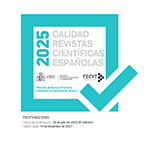Undercover journalism in social networking. Case study: Anna Erelle, in the bowels of the virtual terrorism
Abstract
The rise of the Internet in the last two decades has had a strong impact on journalistic profession. In relation to investigative journalism, social networks have begun to provide a new scenario for journalistic infiltrations and partial immersions, in which journalist use social networks to get in touch with groups of interest, as well as complete immersions on line. The most symptomatic case has been French journalist Anna Erelle’s infiltration using a false profile on social networks to connect with radical Islamic terrorists. His undercover experience is fully developed online and she manages to convince the jihadist Abu Bilel she would marry him to extract information about IS and how yihadism recruit members through social media. Erelle hesitated about the ethics of how the truth is revealed with this technique but flagrant criminal activities convinced her about its suitability. The ethical debate associated to undercover journalism as an investigation method is more intense in social networks because of their easy access, versatility and decentralized structure.Downloads
Article download
License
In order to support the global exchange of knowledge, the journal Estudios sobre el Mensaje Periodístico is allowing unrestricted access to its content as from its publication in this electronic edition, and as such it is an open-access journal. The originals published in this journal are the property of the Complutense University of Madrid and any reproduction thereof in full or in part must cite the source. All content is distributed under a Creative Commons Attribution 4.0 use and distribution licence (CC BY 4.0). This circumstance must be expressly stated in these terms where necessary. You can view the summary and the complete legal text of the licence.










